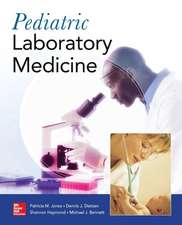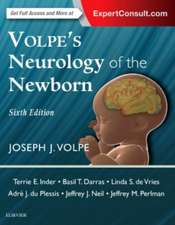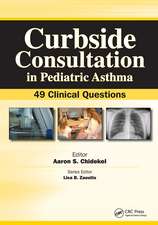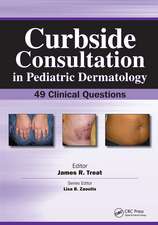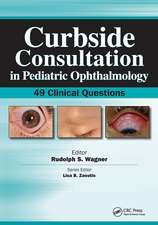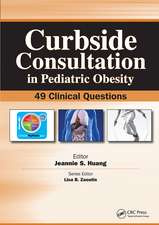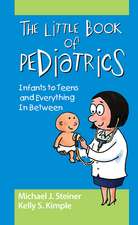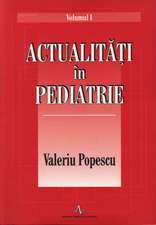Curbside Consultation in Pediatric Infectious Disease: 49 Clinical Questions: Curbside Consultation in Pediatrics
Autor Angela Myersen Limba Engleză Paperback – 15 iun 2012
Dr. Angela L. Myers has designed this unique reference which offers expert advice, preferences, and opinions on tough clinical questions commonly associated with pediatric infectious disease. The unique Q&A format provides quick access to current information related to pediatric infectious disease with the simplicity of a conversation between two colleagues. Numerous images, diagrams, and references allow readers to browse large amounts of information in an expedited fashion.
Curbside Consultation in Pediatric Infectious Disease: 49 Clinical Questions provides information basic enough for residents while also incorporating expert advice that even high-volume pediatricians will appreciate. Pediatricians, nurse practitioners, physician assistants, and family practitioners will benefit from the user-friendly, casual format and the expert advice contained within.
Some of the questions that are answered:
- When is imaging, such as VCUG and renal US, necessary for children with a first UTI?
- Are bleach baths or chlorhexidine plus mupirocin ointment useful to decolonize patients with recurrent MRSA infections? What topical recommendations are useful for patients with recurrent MRSA infections?
- What is the recommended specific treatment of otitis media due to multi-drug resistant pneumococcus?
- If I have a 5-week-old infant with positive rapid viral testing, who does not need hospital admission, is a sepsis evaluation necessary?
- What is likely to be the most common viral pathogens causing diarrhea, since the decrease in rotavirus cases with increase in vaccine uptake?
- When are tick borne infections typically seen in the US; and when does the peak time occur?
Ideal for practicing pediatricians and nurse practitioners, Curbside Consultation in Pediatric Infectious Disease: 49 Clinical Questions is sure to benefit anyone caring for patients with pediatric diseases.
Preț: 852.56 lei
Preț vechi: 897.42 lei
-5% Nou
Puncte Express: 1279
Preț estimativ în valută:
163.19€ • 177.32$ • 137.17£
163.19€ • 177.32$ • 137.17£
Carte tipărită la comandă
Livrare economică 21 aprilie-05 mai
Preluare comenzi: 021 569.72.76
Specificații
ISBN-13: 9781617110016
ISBN-10: 1617110019
Pagini: 276
Dimensiuni: 178 x 254 x 15 mm
Greutate: 0.68 kg
Ediția:New.
Editura: CRC Press
Colecția CRC Press
Seria Curbside Consultation in Pediatrics
ISBN-10: 1617110019
Pagini: 276
Dimensiuni: 178 x 254 x 15 mm
Greutate: 0.68 kg
Ediția:New.
Editura: CRC Press
Colecția CRC Press
Seria Curbside Consultation in Pediatrics
Public țintă
Professional Practice & DevelopmentCuprins
Dedication Acknowledgments About the Editor Contributing Authors Preface Foreword by Janet R. Gilsdorf, MD Introduction Section I?Urinary Tract Infection Question 1 Is It Appropriate to Treat a Suspected Urinary Tract Infection Based on an In Office Urine Dipstick Result, or Should the Specimen Be Sent for Culture? Does the Age of the Patient Have Anything to Do With the Decision? Rene Vandevoorde, MD Question 2 When Should You Attempt to Obtain a Catheter Specimen Versus a Clean Catch Specimen in the Setting of a Suspected Urinary Tract Infection? Rene Vandevoorde, MD Question 3 When Is Imaging, Such As voiding cystourethrogram (VCUG) and Renal Ultrasound, Necessary for Children With a First Urinary Tract Infection? Rene Vandevoorde, MD Question 4 Is Prophylaxis Recommended for All Patients With Vesicoureteral Reflux? Rene Vandevoorde, MD Section II?Methicillin-Resistant Staphylococcus Aureus Question 5 When Is Oral Antibiotic Therapy Necessary in the Setting of Recurrent Methicillin-resistant Staphylococcus Aureus (MRSA) Skin Infection/Boils? Emily A. Thorell, MD Question 6 Are Bleach Baths or Chlorhexidine Plus Mupirocin Ointment Useful to Decolonize Patients With Recurrent Methicillin-resistant Staphylococcus Aureus (MRSA) Infections? What Topical Recommendations Are Useful for Patients With Recurrent MRSA Infections? Emily A. Thorell, MD Question 7 In What Settings Is Methicillin-resistant Staphylococcus Aureus (MRSA) Spread? Emily A. Thorell, MD Question 8 Are There Environmental Cleaning or Personal Hygiene Interventions That Can Be Used To Reduce Recurrences of Methicillin-resistant Staphylococcus Aureus (MRSA) Infections? Emily A. Thorell, MD Section III?Tinea Capitis Question 9 How Long Does Tinea Capitis Need To Be Treated in Order to Be Sure the Infection Has Cleared? Jennifer Goldman, MD and Susan Abdel-Rahman, PharmD Question 10 What Are the Methods by Which Tinea Capitis Can Be Spread From Person To Person? Jennifer Goldman, MD and Susan Abdel-Rahman, PharmD Question 11 Do There Need to Be Visible Lesions to Diagnose Tinea Capitis? Jennifer Goldman, MD and Susan Abdel-Rahman, PharmD Question 12 What Organisms Are Responsible for Causing Tinea Capitis? Jennifer Goldman, MD and Susan Abdel-Rahman, PharmD Section IV?Tick-Borne Illness Question 13 What Are the Best Prophylactic Measures To Tell Families To Use To Prevent Tick Bites? At What Age Are Agents Such as DEET and Picaridin Safe To Use? Jos\u00e9 R. Romero, MD, FAAP and Kimberly C. Martin, DO Question 14 When Are Tick-borne Infections Typically Seen in the United States, and When Does the Peak Time Occur? Jos\u00e9 R. Romero, MD, FAAP and Kimberly C. Martin, DO Question 15 What Is the Best Empiric and/or Prophylactic Therapy for a Child in Whom You Suspect a Tick-borne Infection? Jos\u00e9 R. Romero, MD, FAAP and Kimberly C. Martin, DO Question 16 In What Parts of the United States Is Lyme Disease Seen, How Is Diagnosis Confirmed, and What Is the Appropriate Treatment? Jos\u00e9 R. Romero, MD, FAAP and Kimberly C. Martin, DO Section V?Atypical Pneumonia Question 17 Can You Make a Diagnosis of Atypical Pneumonia by Clinical Presentation, or Is Laboratory Evaluation Required? Christopher R. Cannavino, MD Question 18 What Are the Most Common Ages, Presenting Symptoms, and Common Organisms Associated With Cases of Atypical Pneumonia? Christopher R. Cannavino, MD Section VI?Otitis Media Question 19 What Is the Recommended Specific Treatment of Otitis Media Due To Multidrug-Resistant Pneumococcus? Christopher J. Harrison, MD Question 20 When Should Middle Ear Effusion Fluid Be Obtained? Christopher J. Harrison, MD Question 21 What Do You Do for a Patient Who Has Ear Tubes and Has Continuous Ear Drainage? Question 22 What Is the Recommended Specific Treatment of Acute Otitis Media Due To Multidrug-Resistant Pneumococcus? Christopher J. Harrison, MD Section VII?Pharyngitis Question 23 Is a Throat Culture Necessary in the Setting of a Negative Rapid Streptococcal Antigen Test? Kevin B. Spicer, MD, PhD, MPH and Preeti Jaggi, MD Question 24 What Is the Best Treatment Option for Group A Streptococcal Pharyngitis? What if the Patient Is Allergic to Beta-Lactam Antibiotics? Kevin B. Spicer, MD, PhD, MPH and Preeti Jaggi, MD Question 25 Why do We Treat Streptococcal Pharyngitis When It Is a Self-limited Illness? Kevin B. Spicer, MD, PhD, MPH; Preeti Jaggi, MD; and Angela L. Myers, MD, MPH Question 26 Should I Treat the Asymptomatic Siblings of the Patient Who Has a Positive Rapid Streptococcal Antigen Test? Kevin B. Spicer, MD, PhD, MPH; Preeti Jaggi, MD; and Angela L. Myers, MD, MPH Question 27 What Are the Best Clinical Indicators That My Patient May Have Streptococcal Pharyngitis? Kevin B. Spicer, MD, PhD, MPH and Preeti Jaggi, MD Section VIII?Viral Testing Question 28 How Sensitive and Specific Are the Office-Based Rapid Respiratory Syncytial Virus and Rapid Influenza Tests? Rebecca C. Brady, MD Question 29 If I Have a 3-Month-Old Infant in the Office With Respiratory Symptoms and Negative Viral Testing, Should I Proceed With a Sepsis Evaluation? Archana Chatterjee, MD, PhD Question 30 If I Have a 5-Week-Old Infant With Positive Rapid Viral Testing Who Does Not Need Hospital Admission, Is a Sepsis Evaluation Necessary? Archana Chatterjee, MD, PhD Section IX?Diarrhea Question 31 When Are Antibiotics Indicated for a Child With a Bacterial Cause of Diarrhea? Amber Hoffman, MD Question 32 What Is Likely To Be the Most Common Viral Pathogens Causing Diarrhea Since the Decrease in Rotavirus Cases With Increase in Vaccine Uptake? Amber Hoffman, MD Section X?Upper Respiratory Tract Infection/Sinusitis Question 33 When Should I Be Worried About Immune Deficiency in the Setting of Recurrent Upper Respiratory Tracts Infections? Adam L. Hersh, MD, PhD Question 34 What Are the Most Common Viral Respiratory Pathogens in Infants in the First Year of Life? Adam L. Hersh, MD, PhD Question 35 What Antibiotics Are Recommended Empirically for Acute Bacterial Sinusitis in a Patient Who Has Not Received Antibiotics Recently? Adam L. Hersh, MD, PhD Question 36 What Antibiotics Are Recommended to Treat Acute Bacterial Sinusitis in the Patient Who Had a Course of Amoxicillin Within the Last Few Weeks for Otitis Media? Adam L. Hersh, MD, PhD Section XI?Community-Acquired Pneumonia Question 37 What Is the Most Common Pathogen Involved in Community-Acquired Pneumonia, and the Empiric Therapy of Choice in the Preschool–Aged Child With Fever to 102\u00baF, Rales, and a Lobar Infiltrate on Chest Radiograph? Christopher R. Cannavino, MD Question 38 For What Clinical Presentation Should Concern Arise About Staphylococcus aureus as the Cause for Pneumonia in My Patient? Christopher R. Cannavino, MD Section XII?Epstein-Barr virus/Cytomegalovirus Question 39 When Are Steroids Indicated in the Setting of Known Acute Epstein-Barr virus (EBV) Infection? Masako Shimamura, MD and Rebecca Widener, MD Question 40 What Laboratory Test(s) Should Be Obtained in the Setting of Suspected Congenital Cytomegalovirus (CMV) Infection? Masako Shimamura, MD and Rebecca Widener, MD Question 41 When Should Serologic Testing Be Performed Instead of a Monospot, and How Do I Interpret Results of Epstein-Barr virus (EBV) Serologies? Masako Shimamura, MD and Rebecca Widener, MD Question 42 What Should I Tell a Pregnant Mother of a 2-Year-Old Who Has Recently Been Diagnosed With Congenital Cytomegalovirus (CMV) Infection About Her Risk for Developing Infection As Well As Prevention Techniques? Masako Shimamura, MD and Rebecca Widener, MD Section XIII?Lymphaden
Notă biografică
Angela L. Myers, MD, MPH, FAAP, is a board-certified pediatric infectious diseases physician and is currently an Assistant Professor of Pediatrics at the University of Missouri-Kansas City School of Medicine. She is the pediatric infectious diseases fellowship director at Children's Mercy Hospital & Clinics. Dr. Myers received her undergraduate and medical degree from the University of Missouri-Kansas City School of Medicine in the combined 6-year program, and completed her pediatrics residency and pediatric infectious diseases fellowship at Children’s Mercy Hospitals & Clinics. Active in research, her main interests revolve around childhood and adult vaccine knowledge, attitudes, and beliefs, as well as using novel health information technologies to improve vaccination rates for influenza. She currently oversees several funded studies evaluating vaccine beliefs as well as implementation of various strategies to increase immunization rates of both children and adults. She is the author of 2 book questions and more than 15 publications in pediatric journals and is also actively involved in committee work for the Pediatric Infectious Diseases Society program training committee and the graduate medical education council at her affiliated medical school.
Descriere
Curbside Consultation in Pediatric Infectious Disease: 49 Clinical Questions provides quick answers to the tricky questions most commonly posed during a "curbside consultation" between pediatricians.








